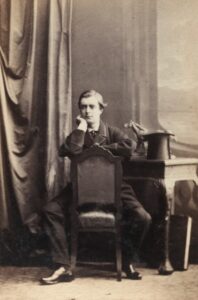Historical scenes 1: The Bishop makes hot chocolate
1st Dec 2023 - Blog
When you read early literature, you frequently come across things you would like to share. The personalities of those who
In the later 1860s, the age of European discovery in New Zealand has taken a turn. There is a war raging, manifest in numerous conflicts in Taranaki and the West Coast of the North Island, the Waikato, Bay of Plenty, and Poverty Bay. Notable Māori leaders such as Titokawaru and Te Kooti are dominant, and Māori are divided between those supporting the Waikato-led King movement (Kingites) and those assisting the Government (Queenites). The Great South Road is forged, marching into the heart of the Waikato, and later, travel is on metalled roads, with Cobb & Co running services down the North Island, Taupo to Napier, and in the south, Christchurch to Dunedin.
In the midst of this British military men, and adventurers such as John St John and Herbert Meade, are involved in the fighting and write their accounts, Lt Col Thomas McDonnell writes to justify his actions in Pātea, and Hochstetter, after the conflicts are largely over, swoops in and in 18 months establishes geological surveying, and takes a couple of unique frogs back to Vienna.
 The photo of Herbert Meade, 4th son of an earl, sitting astride a chair with all the relaxed charm of his up-bringing perhaps is a sign of the changes. Still in his twenties, he carries out a mission for Governor Grey, into the heart of the Waikato, gets caught by members of the pai marire (Hau Hau) movement who debate his possible death, and in the end goes back to England, only to be blown up while working with explosives at the Royal Navy Portsmouth depot.
The photo of Herbert Meade, 4th son of an earl, sitting astride a chair with all the relaxed charm of his up-bringing perhaps is a sign of the changes. Still in his twenties, he carries out a mission for Governor Grey, into the heart of the Waikato, gets caught by members of the pai marire (Hau Hau) movement who debate his possible death, and in the end goes back to England, only to be blown up while working with explosives at the Royal Navy Portsmouth depot.
Then, rarely amongst the early literature, there is an account from a woman. Maria Thomson runs girls schools, buys up land and runs businesses, and the writes an account of some travels as she goes back home to England, letting it be known what she thinks of Auckland (not good), and though long widowed, determinedly retaining her name as Mrs Charles Thomson.
Some writing on all these can be found here (read more) in a new posting in the series Remote in Southern Seas.
1st Dec 2023 - Blog
When you read early literature, you frequently come across things you would like to share. The personalities of those who
12th Jan 2024 - Blog
In the late 18th and early 19th centuries, going to prison, if you had some means, was not necessarily the